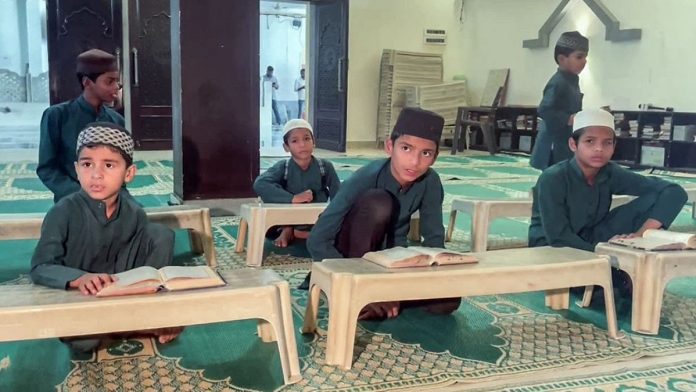New Delhi: The National Commission for Protection of Child Rights (NCPCR) has been facing criticism for its intensified scrutiny of madrasas, with many questioning why similar institutions from other religious communities have not been subjected to the same level of investigation. The Supreme Court has also raised concerns about the commission’s approach, asking why it has focused exclusively on madrasas while ignoring institutions such as pathshalas and monasteries.
Former NCPCR chairperson Priyank Kanoongo, who spearheaded the campaign against madrasas from 2018 to 2024, has continued his efforts even after stepping down. He is now writing a book on madrasas, claiming that many remain unregistered, operate arbitrarily, and fail to comply with national education standards. According to him, these institutions lack qualified teachers and do not follow the Right to Education (RTE) Act, exposing children—particularly non-Muslim students—to an education system that he argues fosters radicalization.
Muslim organizations and madrasa boards have rejected these allegations, accusing Kanoongo and the NCPCR of engaging in a politically motivated campaign that aligns with the ruling BJP’s ideological agenda. Critics argue that instead of supporting educational reforms across all religious institutions, the commission has disproportionately targeted madrasas, fueling communal polarization. The Supreme Court, in an October 2024 hearing, directly questioned the NCPCR’s selective focus and asked whether similar interventions were carried out in Hindu religious schools, highlighting the perception that the commission was not acting impartially.
During Kanoongo’s tenure, the NCPCR carried out several surprise inspections, including one in Bihar’s Saran district in May 2024. The raid, conducted alongside the police, led to allegations that the madrasa was involved in unlawful activities. However, critics pointed out that such operations, widely publicized on social media, contributed to fear-mongering rather than genuine reform. In another high-profile case, Kanoongo visited an orphanage-cum-madrasa in Bengaluru, describing the conditions as akin to a “medieval Taliban-like life.” The Karnataka police later booked him for trespassing and inflammatory remarks, though the Karnataka High Court eventually quashed the case. Many madrasa administrators have accused NCPCR officials of using intimidation tactics. A madrasa head in Dehradun described an inspection as an act of harassment rather than a genuine educational review, alleging that the officials arrived not to inspect but to threaten.
One of the most contentious aspects of NCPCR’s campaign was its opposition to Hindu children studying in madrasas. In October 2024, Kanoongo released a report titled Guardians of Faith or Oppressors of Rights, which claimed that madrasas were indoctrinating Hindu students with Islamic teachings. The commission recommended that all non-Muslim children be removed from madrasas and placed in mainstream schools. The report also alleged that madrasas in Bihar were using textbooks published in Pakistan and containing “objectionable content.” This led to renewed calls from the NCPCR for state governments to withdraw funding from madrasas, further escalating tensions between the commission and Muslim educational institutions. However, madrasa authorities dismissed these claims, arguing that Hindu children often attend madrasas out of economic necessity, as these institutions provide free education, meals, and shelter to underprivileged students regardless of religion.
The NCPCR’s intensified focus on madrasas has sparked a broader debate on whether child protection laws are being applied selectively. Critics argue that similar concerns—such as lack of modern subjects, poor infrastructure, and unregulated education—exist in Hindu religious schools and gurukuls, yet they have not faced the same level of scrutiny. While Kanoongo insists that only 10% of his efforts were dedicated to madrasas, the disproportionately high media attention on these cases has reinforced the perception that the commission’s actions were politically driven. As the debate continues, the fundamental question remains: Is the campaign against madrasas a genuine effort to uplift children’s education, or is it a targeted political move that risks deepening communal divisions?




